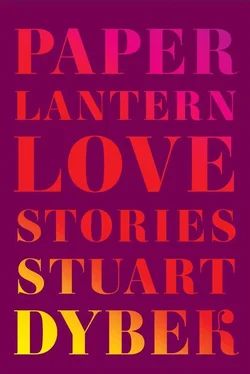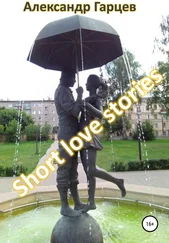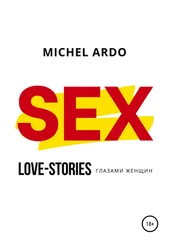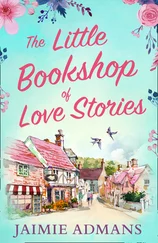“Let’s follow them,” she said.
I was sorry I’d left my watch and the car keys behind, in one of my shoes. We walked, glancing back to see if our encampment was safe: our towels, the cooler with its iced bottle of champagne, the blue ukulele on which I could pick out “Blue Moon” but no longer remembered how to tune, and the umbrella she called her Italian umbrella.
That faded beach umbrella obviously meant something to her. I recalled a day toward the end of one of our first summers together—they seemed a single, seamless summer now—when we’d accidentally left it behind. We had camped on the windward shore of a peninsula that wasn’t on the highway map and, after drinking a bottle of wine, lay kissing beneath the umbrella, beside the surf as if—Mariel joked—we were auditioning for parts in the love scene in From Here to Eternity . We’d fooled around at beaches before—Mariel called it mashing—but that particular afternoon we kissed in a trance. I stretched out against her and she began to tremble until she was in the throes of an abandoned shuddering. It felt like we were connected only by the pressure of our lips, even when she locked her legs around me and clung, intent upon taking me along to wherever she was rushing. Her breath seemed to echo through my body, through a labyrinthine network of self I didn’t know existed until I heard her moaning lost in it.
Afterward, we lay drowsily staring at the underside of the umbrella, Mariel squeezing my hand with each aftershock. The sounds of gulls and surf arrived as if from a great distance.
“That was oceanic,” she whispered.
“Have you ever come kissing before?” It wasn’t the kind of question I normally asked, but I felt shaken, changed. It had never happened to me with anyone.
“Sometimes in dreams,” she said. “Sometimes I wake coming.”
“With whom?”
“I don’t know.”
“You don’t remember who once you wake?”
“It’s always a stranger.”
We repacked the beachmobile in a daze and must have driven off leaving the folded umbrella leaning against a tree I’d parked beneath for shade.
That night, Mariel called to say she’d just realized her Italian umbrella was missing. I felt I’d left something behind, as well, though I couldn’t say what. Truth be told, the umbrella was ratty—lopsided, rust-stained, mildewed—an anomaly, given her otherwise tastefully chosen beach gear. When I offered to buy her a new one, she was insulted that I’d think it was a matter of money. Her sense of loss over an umbrella seemed at odds with her avowed disregard for the past. It was well after dark when she called, and the beach we’d happened upon was an hour and a half away down an unlit back road. I wasn’t sure I could locate it again even in daylight. Although I didn’t hold much hope for finding the umbrella, I offered to go back with her the next morning.
In the middle of the night, unable to sleep, Mariel unhitched the horse trailer from her pickup and drove back alone. The entrance to the beach was unmarked and she wasn’t sure she’d found the right turnoff. Her headlights followed a sandy two-track to a crest of hissing pines. On the other side, a dune descended to the water. She could hear the scuff of combers. She dug a balky flashlight from the glove compartment and stepped out but she couldn’t identify the tree we’d parked beneath. She searched around each tree as her flashlight flickered and died. While she pounded the battery chamber against her palm, marbled clouds parted above, revealing a moon of luminescent blue.
Oh, look at the moon! she told herself.
The vision was worth the drive. Then, across the beach, near the water’s edge, she saw the silhouette of an umbrella. She distinctly remembered uprooting her umbrella as we’d gathered our things from the sand, and my asking her, “How could I not love you?” to which she’d replied, “A rhetorical question?”
Wind in her face, she skidded down the dune, and jogged past the embers of a driftwood fire reflecting off shards of wine jugs, expecting the silhouette to be revealed as an optical illusion, a mirage of moon glow. A snatch of song stopped her in her tracks. You saw me standing alone : over the surf, a voice carried the melody of “Blue Moon” before a gust blew it away. Shadows thrusting beneath the umbrella seemed to possess the substance of bodies. It’s just kids, lovers , she thought. At the same instant, she realized how alone she was—no one even knew she was there. The wind thrashed the water and drove the sky. A fuming collision of clouds snuffed the moon just as a draft lifted the umbrella off the sand, whisking the shadows beneath it into darkness. Mariel had the urge to flee back to her pickup before she was erased, but she’d come too far to give up.
She chased the umbrella as it wheeled along the shore and was sucked into the surf. She waded in, grabbing for the canvas canopy, but the backwash ripped it away, knocking her off balance. She floundered to her feet, lunged for the umbrella, and was knocked down again. Choking, she fought to surface against an undertow of raking hands. She was clubbed across the mouth but managed to seize the bobbing pole of the umbrella and, in a momentary trough between waves, drag it ashore.
She knelt on the beach gasping for breath, already shivering, suddenly aware the waves had shredded her blouse. The umbrella, waterlogged and caked with sand, was as ungainly in the wind as the sail of a dismasted boat. Its ribs were bent, but she was able to fold it partially and lug it up the dune. She’d lost the flashlight and was terrified she’d lost her truck keys, too, but they were wadded in wet Kleenex in the pocket of her jeans.
By cab light, she dabbed the Kleenex over her bloodied breasts looking for where she’d been cut until she realized the blood was drooling from her split lip. It felt to her tongue as if she’d chipped a canine. She loaded the umbrella into the truck bed and, careful not to spin the tires in the sand, got the hell out of there.
The next day, when she told me the story, I chastised her for going alone. “You should have called me,” I said.
“I wasn’t going to wake you at two a.m. If I hadn’t gone then, I’d have lost it.”
When I asked what it was about the umbrella that made it so important, she answered that what had drawn her to me was that I seemed to understand instinctively that a person is defined by the present—and by the possibility of change that living in the present affords. The past, as far as she was concerned, was another word for stasis; the only means of changing the past was to lie about it. She’d thought I agreed that it wasn’t necessary for people to know every little boring, neurotic detail about each other. The way she said it implied that maybe her assumptions about me had been wrong.
I didn’t reply, but her rebuke bothered me, and not just because it was unfair—from the time we’d met I’d been anything but overly inquisitive. What I found disturbing was that the more defensive she became, the less she seemed to realize how sketchy her past actually was.
I had presumed that part of the attraction between us was that we were both loners. As loners do, we’d made a private world together. What did I care, at least at first, about her past? The relationships I’d had until then never lasted long enough for history and its supposed predictive power to matter. It seemed enough that Mariel was beautiful to me. If that was a questionably romantic basis for a relationship, then I was willing to admit, at least in retrospect, to having chosen—in that unconscious way one chooses without being aware that one has—a life of sensation over a life of meaning. Maybe the real choice I made was to accept the consequences. Perhaps beauty was different in Keats’s time, but I never expected that beauty, at least physical beauty, would equate with truth.
Читать дальше












